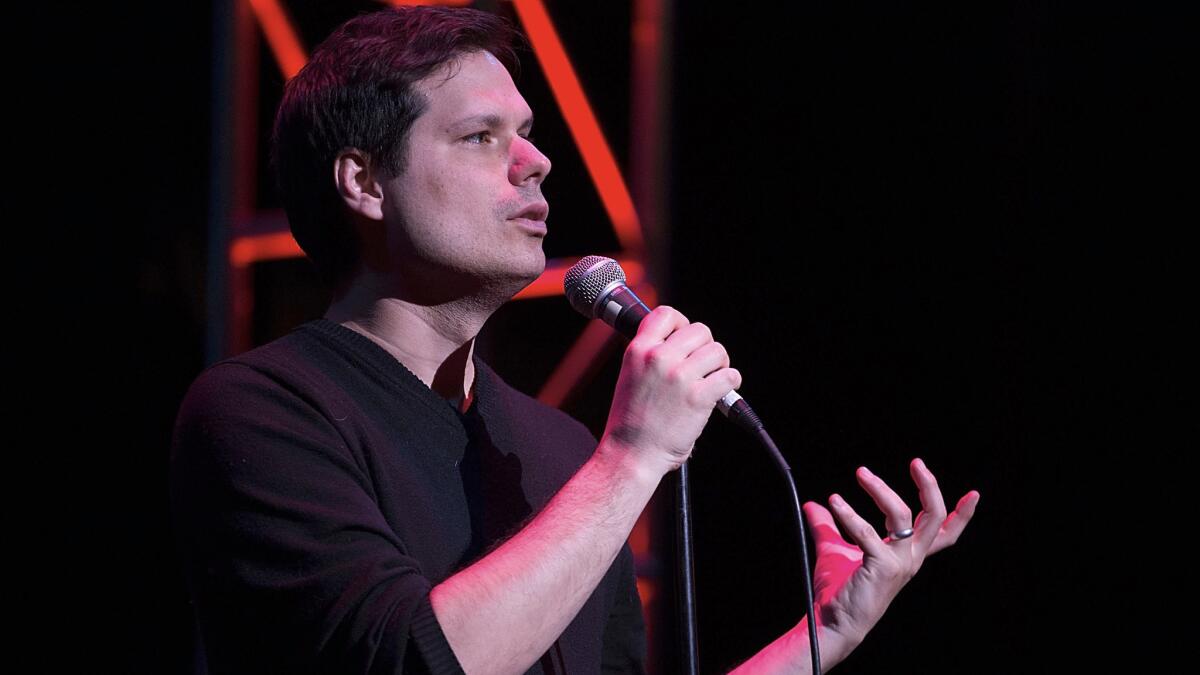Comedian Michael Ian Black channels anger in his act and on social media

- Share via
It’s hard not to be angry about much of what’s going on in politics this hyper-partisan election year — and comedians are no exception in their standup and on social media.
Late-night hosts like Samantha Bee and John Oliver assert their frustration and anger on a regular basis. For Michael Ian Black, this omnipresent sense of ire has manifested itself on Twitter, where he argues about current events for several hours a day, and in a new picture book called “A Child’s First Book of Trump,” a Dr. Seuss-like tome that parodies the Republican candidate.
Black isn’t necessarily trying to fuel the outrage, though. Instead, he wants to create a discourse that allows the public to become less angry together. “I’m not trying to rile people up,” he says. “I’m not trying to start a riot. I don’t allow pitchforks into my shows. It’s just about having a conversation.”
We spoke to the comedian and actor, who currently appears in Comedy Central’s “Another Period,” about comedy, anger and the state of affairs in America.
What has encouraged you to be so engaged on Twitter about politics?
My Twitter feed is only a reflection of what I’m thinking about at the moment, so during the presidential cycle I’m very invested in the presidential election.
Why argue with people?
I will post something that I think is funny or factual or whatever, and then somebody will respond to me by calling me “irrelevant” or “ugly” and increasingly will insult my religion. And then I will choose to engage or not engage. Sometimes someone will rile me up and I’ll go back and forth with them. The one thing I don’t do — or I try not to do — is personally insult people.
What has been your fans’ response to your daily arguments?
I think I lose some followers and gain some followers. I’m not concerned about it. Twitter is a free platform and if people don’t like the content I’m providing for free they are welcome to unfollow me. I feel no obligation to them. I feel no obligation to entertain. I feel no obligation to be funny. So I’m not concerned about followers, except for this one annoying thing, which is that I’ve been stuck at 1.99 million followers for months and I would be lying if I denied that that drove my crazy. I should just buy some Twitter bots!
What issue upsets you the most right now?
There’s two. The first is the rise of Trump and what it reveals about our culture. That cascades into a number of issues. And the second is gun control. Trying to find a reasoned way to move forward on gun control. And let’s not even say gun control: Let’s say trying to find a way to have lowered gun deaths in this country.
Are these sorts of topics making their way into your standup?
A little bit, yeah. Not because I don’t want to, but because I haven’t figured out how to do it. I’m not concerned about alienating people or turning people off, but I am concerned about being fair and fair-minded and acknowledging that one side does not have a monopoly on the truth and one side does not have a monopoly on good policy suggestions.
How does your response to current events compare with your fellow comedians?
It’s been pretty similar. I’m not a political comedian — I’m not particularly good at being funny about politics. Some would argue that I’m not particularly funny about anything. But I don’t know that I’m trying to make anybody laugh. I’m just sharing information and giving opinions and if they’re funny, great. There are other comedians out there who are so much more adept at pointing out political hypocrisy in a funny way. Like everybody, I mourn the loss of Jon Stewart during this election cycle. I don’t think anybody’s done it better than he did it because he was able to be thoughtful and funny and respectful.
Overall, do you think that comedy is an effective way to channel our collective outrage?
It may be the best way. It’s certainly healthier than any other option I can think of at the moment. Comedy only works if it is thoughtful. It requires a level of analysis that shouting your opinion does not require. You are purposely trying to elicit an emotional response and the emotional response you’re trying to elicit is laughter. If people don’t recognize something in what you’re saying they just won’t laugh, so you have to be thoughtful about it.
MORE
On TV, rage has become the new romance
Anger is an energy for a new wave of women in pop culture
More to Read
The biggest entertainment stories
Get our big stories about Hollywood, film, television, music, arts, culture and more right in your inbox as soon as they publish.
You may occasionally receive promotional content from the Los Angeles Times.










